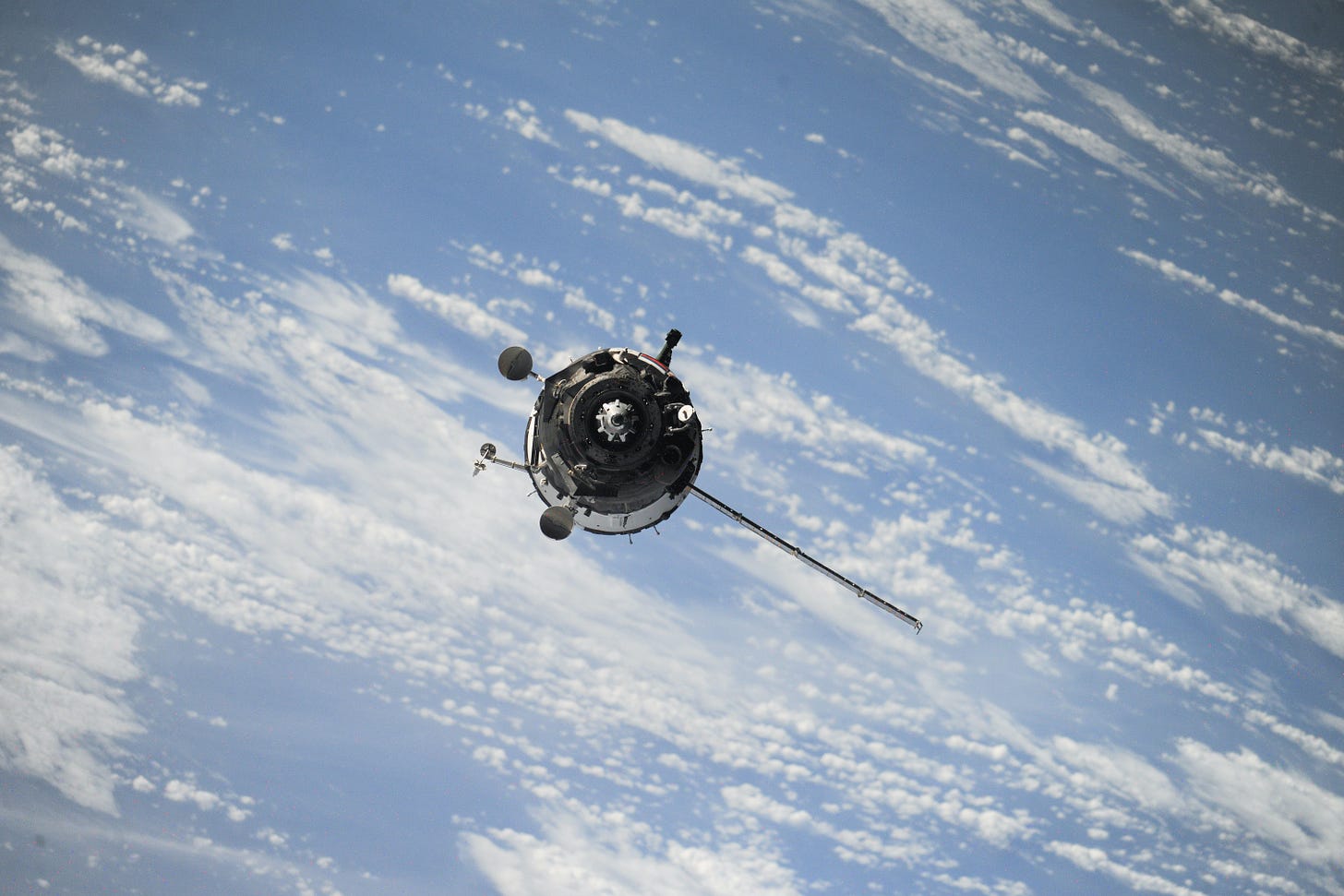#005: Keeping outer space usable
Feat. Elderly Loneliness, Smart Toilets, and "Yes, and..."
The IdeaList is a newsletter exploring social issues and ideas for making the world a better place.
Subscribe for free to stay up to date and support my work.
In This Edition (5 minute read)
How our ever-growing space junk problem could render space unusable
The Idea List, which explores senior citizen loneliness, reducing gun deaths, roads as electric vehicle chargers, smart toilets, and prescription drug prices
The concept of “Yes, and…”
Earlier this month, a geomagnetic storm knocked 40 of SpaceX’s Starlink satellites out of commission. While SpaceX says that the satellites will burn up upon re-entering the atmosphere, this event sparked a lot of chatter about one of my favorite problems: space junk. I was going to write this whole section about it, but then Tristan Wagner (my friend, coworker, and bowling partner) sent me this amazing post from the Year 2049 newsletter that does a really good job of explaining the problem and pointing out some startups developing solutions! You should definitely read their post. But if you’re interested in how I think about space junk, here you go.
Over the years, humans have launched a bunch of stuff into space. This stuff (mostly satellites) serves important functions, like providing GPS and monitoring the climate, and ideally we want to be able to launch more stuff into space. Companies like SpaceX and Amazon are sending thousands of satellites into space over the next few years in hopes of providing internet for the entire world, which sounds awesome in theory!
The problem is that space is getting crowded. Most of the stuff we have launched into space is now defunct, and defunct satellites collide with each other, blow up, or break apart, multiplying the debris flying around Earth. The debris is dangerous, whipping around Earth at about 16,000 mph. In a 2021 report on orbital debris (also referenced by Year 2049), NASA reported over 26,000 pieces of junk that could destroy a satellite on impact, over 500,000 pieces of junk that could cause damage to spacecraft or satellites, and over 100 million pieces of junk that could puncture a spacesuit. And we can’t even track the pieces that closely! Emergency maneuvers are becoming more common for space stations and satellites, and more collisions mean more space junk.
In economics, this is a classic tragedy of the commons problem, and space will become useless if we keep moving in the direction we’re going. If we want space to be usable (which I really think we do), we need solutions to track and remove existing junk from orbit and to regulate the future use of space. There are a lot of really smart people starting to work on the technical side of this problem (but sadly RISC can’t build a spaceship to collect space junk), and I’m interested in seeing what Privateer Space accomplishes in this regard. International agreements are pretty hard, so regulation might be out of the question. But without solutions or cooperation, we might be using paper maps in 2050!
If it were up to me, we would outfit the thousands of outgoing SpaceX and Amazon satellites with garbage collectors (nets, if you will). What’s your crazy idea to solve the space junk problem?
The Idea List
👵🏻 A national pilot on senior citizen loneliness
My amazing colleagues received press for our work with the Monroe County Retired Senior Volunteer Program (RSVP) to create a heat map of senior citizen loneliness. I’m really excited to see where this project goes.
🔫 Reduce gun violence with smart guns, liability insurance, and beautification
Working on social change in Chicago, reducing gun violence is often top of mind. Here are three very different approaches that caught my eye this month.
🚽 Measure vitals signs using toilets
This idea captures one of my fundamental approaches for making a difference in the world: meet people where they’re at. Everyone has to use the toilet, so I like the idea of designing an intervention around toilets that make people’s lives better.
🛣️ Turn roads into electric vehicle chargers
I had to plug this innovation coming out of my home state. My question: if we can charge our cars by driving on the road, can we power our cities in the same way?
💊 Charge less for prescription drugs (because we can)
Mark Cuban’s CostPlus Drug Company helps visualize the high cost of prescription drugs in the United States. The site doesn’t take insurance, but it makes you wonder why the cost-plus-15% price of a drug like Albenzadole (for tapeworms) is over $6000 less than the retail price.
One Last Thing:
This month, I’m thinking a lot about the concept of “Yes, and…” from improv comedy.
On an episode of the The Tim Ferriss Show, Michael Lewis (author of Moneyball and The Big Short) talks about how the rules of improv comedy help him generate better ideas. In improv, you’re supposed to accept what the person before you says and build on it. His best advisors do this with him during brainstorms, and he says it helps his ideas reach new heights.
He also recounts a wonderful quote from Danny Kahneman (author of Thinking, Fast and Slow): “Don’t try to show me how smart you are by showing how stupid everybody else is. Show me how smart you are by showing me how smart everybody else is.”
Until next time,
Noah
P.S. I’m on vacation next week, so I’ll see you in two weeks!
Previous Editions
You can also check out all previous editions of The IdeaList to read about other big social issues and ideas for making the world a better place.

